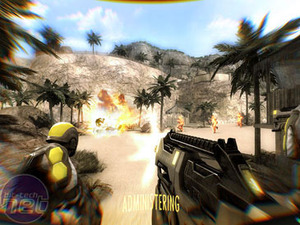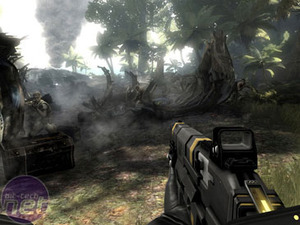
On the other hand though, Haze uses story in a different way and tries to create a game with multiple, complex themes and subtexts which play out over the whole experience.
Haze tells the story of Shane Carpenter, who works as a hired soldier for the Mantel Corporation, which controls every single facet of modern living. Shane and his co-troopers believe they are working as a power for good in the world and use a performance-enhancing drug called Nectar to help them in combat. From the outset you can see where the story may lead, with Mantel being essentially the same evil mega-corporation as seen in Resident Evil.
Of course, nothing is as simple as it first appears and players are quickly invited to see that ideas of good and evil are purely subjective. This is achieved not only through story, but through gameplay as Rob points tells us;
"There’s a flip-side to Nectar. If they inject too much, they will Overdose. Now, in this state, they’ll turn into an uncontrollable gun-crazed maniac. They’ll be unable to tell friend from foe, and they’ll shoot at anything that moves. And for the record, that doesn’t just happen to A.I characters, it can happen to the players too – even in multiplayer. So, you could be fighting alongside your best buddy, but if he happens to overdose, he’ll suddenly become your worst enemy – shooting at you like you just pushed his mum down the stairs."


Haze uses gameplay features like the 'Nectar Disruption' to refer to real-world issues of simulated violence.
From a story-driven point of view, Nectar also censors reality for players so that, with the Nectar suit equipped and visor down, players experience life as a video game; baddies fall over and die quickly with little lasting effect.
Slipping the visor off however presents a very different world where the colours are more accentuated and ugly, with enemies falling and bleeding grossly as they die slow and painful deaths. It's an obvious commentary on the de-sensitization caused by mass media and it's incredibly clever.
"The main narrative is a straight-forward character-driven affair but I’ve tried to make its metaphorical layers open to different interpretations.
"On the one hand, the effect of Nectar ‘censoring’ reality could be seen as a comment on the ubiquitous ‘Media’. However, it could be seen more specifically as an observation about video games – how we sell a muted form of extreme violence in order to pay our mortgages. It’s an odd situation to be in – I’m a law-abiding guy, and like most people, I find real-life violence absolutely sickening. But at the same time, I get a huge kick out of shooting people in the face in Haze. The older I get, the weirder that dichotomy feels."
Still, Haze isn’t all metaphors and subtexts despite Apocalypse Now being the main inspiration and Rob was quick to point out that players can also just jump in and kick some ass.
"Don’t worry, folks at home, HAZE isn’t going to lecture you to death – there’ll be shotguns and such."

Games like Postal 2 also explore themes of violence and censorship, albeit in a different way.
We tried to push Rob for some more details on the specific commentaries he wanted to make with Haze but it's clear he's experienced a bit of a burn as a result of tackling such controversial issues and when we asked him if the idea of armed forces fighting against inferiorly armed rebels was a deliberate commentary on anything in particular, he would only say that:
"Everything in HAZE is deliberate. So I’m deliberately saying as little as possible about that topic. I’m already in enough trouble."
Haze goes deeper than most FPS games in that it tackles violence by trying to show gamers that there may not be a stark contrast between right and wrong. When we saw Haze previewed earlier in the year Rob said this was to do with the idea that the world was actually filled with shades of grey, only with specific groups trying to tell us that it has black and white parts.
It goes to show then that FPS games, which are commonly demonised by mass media and blamed equally by Jack Thompson and Daily Mail readers for all of society's ills, can often actually tackle important and relevant issues in an intelligent and concise manner. This can be built into the gameplay, as with Haze or it can be a subtext which plays across multiple games, like the social responsibility issues touched upon in Half-Life 1 or the guilt driving the returning characters of Dr Kliener and Eli Vance in Half-Life 2.
Haze tells the story of Shane Carpenter, who works as a hired soldier for the Mantel Corporation, which controls every single facet of modern living. Shane and his co-troopers believe they are working as a power for good in the world and use a performance-enhancing drug called Nectar to help them in combat. From the outset you can see where the story may lead, with Mantel being essentially the same evil mega-corporation as seen in Resident Evil.
Of course, nothing is as simple as it first appears and players are quickly invited to see that ideas of good and evil are purely subjective. This is achieved not only through story, but through gameplay as Rob points tells us;
"There’s a flip-side to Nectar. If they inject too much, they will Overdose. Now, in this state, they’ll turn into an uncontrollable gun-crazed maniac. They’ll be unable to tell friend from foe, and they’ll shoot at anything that moves. And for the record, that doesn’t just happen to A.I characters, it can happen to the players too – even in multiplayer. So, you could be fighting alongside your best buddy, but if he happens to overdose, he’ll suddenly become your worst enemy – shooting at you like you just pushed his mum down the stairs."


Haze uses gameplay features like the 'Nectar Disruption' to refer to real-world issues of simulated violence.
From a story-driven point of view, Nectar also censors reality for players so that, with the Nectar suit equipped and visor down, players experience life as a video game; baddies fall over and die quickly with little lasting effect.
Slipping the visor off however presents a very different world where the colours are more accentuated and ugly, with enemies falling and bleeding grossly as they die slow and painful deaths. It's an obvious commentary on the de-sensitization caused by mass media and it's incredibly clever.
"The main narrative is a straight-forward character-driven affair but I’ve tried to make its metaphorical layers open to different interpretations.
"On the one hand, the effect of Nectar ‘censoring’ reality could be seen as a comment on the ubiquitous ‘Media’. However, it could be seen more specifically as an observation about video games – how we sell a muted form of extreme violence in order to pay our mortgages. It’s an odd situation to be in – I’m a law-abiding guy, and like most people, I find real-life violence absolutely sickening. But at the same time, I get a huge kick out of shooting people in the face in Haze. The older I get, the weirder that dichotomy feels."
Still, Haze isn’t all metaphors and subtexts despite Apocalypse Now being the main inspiration and Rob was quick to point out that players can also just jump in and kick some ass.
"Don’t worry, folks at home, HAZE isn’t going to lecture you to death – there’ll be shotguns and such."

Games like Postal 2 also explore themes of violence and censorship, albeit in a different way.
We tried to push Rob for some more details on the specific commentaries he wanted to make with Haze but it's clear he's experienced a bit of a burn as a result of tackling such controversial issues and when we asked him if the idea of armed forces fighting against inferiorly armed rebels was a deliberate commentary on anything in particular, he would only say that:
"Everything in HAZE is deliberate. So I’m deliberately saying as little as possible about that topic. I’m already in enough trouble."
Haze goes deeper than most FPS games in that it tackles violence by trying to show gamers that there may not be a stark contrast between right and wrong. When we saw Haze previewed earlier in the year Rob said this was to do with the idea that the world was actually filled with shades of grey, only with specific groups trying to tell us that it has black and white parts.
It goes to show then that FPS games, which are commonly demonised by mass media and blamed equally by Jack Thompson and Daily Mail readers for all of society's ills, can often actually tackle important and relevant issues in an intelligent and concise manner. This can be built into the gameplay, as with Haze or it can be a subtext which plays across multiple games, like the social responsibility issues touched upon in Half-Life 1 or the guilt driving the returning characters of Dr Kliener and Eli Vance in Half-Life 2.

MSI MPG Velox 100R Chassis Review
October 14 2021 | 15:04









Want to comment? Please log in.